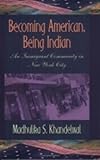Becoming American, Being Indian : An Immigrant Community in New York City / Madhulika S. Khandelwal.
Material type: TextSeries: The Anthropology of Contemporary IssuesPublisher: Ithaca, NY : Cornell University Press, [2018]Copyright date: ©2002Description: 1 online resource (224 p.) : 2 maps, 12 halftones, 4 tablesContent type:
TextSeries: The Anthropology of Contemporary IssuesPublisher: Ithaca, NY : Cornell University Press, [2018]Copyright date: ©2002Description: 1 online resource (224 p.) : 2 maps, 12 halftones, 4 tablesContent type: - 9781501722028
- Asian Americans -- New York (State) -- New York -- Ethnic identity
- Asian Americans -- New York (State) -- New York -- Social conditions
- East Indian Americans -- Cultural assimilation -- New York (State) -- New York
- East Indian Americans -- New York (State) -- New York -- Ethnic identity
- East Indian Americans -- New York (State) -- New York -- Social conditions
- Immigrants -- New York (State) -- New York -- Social conditions
- Anthropology
- Asian Studies
- SOCIAL SCIENCE / Anthropology / Cultural & Social
- 305.891/4110747 22
- F128.9.E2 K47 2002eb
- online - DeGruyter
| Item type | Current library | Call number | URL | Status | Notes | Barcode | |
|---|---|---|---|---|---|---|---|
 eBook
eBook
|
Biblioteca "Angelicum" Pont. Univ. S.Tommaso d'Aquino Nuvola online | online - DeGruyter (Browse shelf(Opens below)) | Online access | Not for loan (Accesso limitato) | Accesso per gli utenti autorizzati / Access for authorized users | (dgr)9781501722028 |
Frontmatter -- Contents -- Preface -- Introduction -- [I]. The Landscape of South Asian New York -- [2]. Transplanting Indian Culture -- [3]. Worship and Community -- [4]. Building Careers, Encountering Class -- [5]. Famlly and Gender -- [6]. Elders and Youth -- [7]. The Evolution of South Asian Organizations -- Notes -- References -- Index -- The Anthropology of Contemporary Issues
restricted access online access with authorization star
http://purl.org/coar/access_right/c_16ec
Since the 1960s the number of Indian immigrants and their descendants living in the United States has grown dramatically. During the same period, the make-up of this community has also changed—the highly educated professional elite who came to this country from the subcontinent in the 1960s has given way to a population encompassing many from the working and middle classes. In her fascinating account of Indian immigrants in New York City, Madhulika S. Khandelwal explores the ways in which their world has evolved over four decades.How did this highly diverse ethnic group form an identity and community? Drawing on her extensive interviews with immigrants, Khandelwal examines the transplanting of Indian culture onto the Manhattan and Queens landscapes. She considers festivals and media, food and dress, religious activities of followers of different faiths, work and class, gender and generational differences, and the emergence of a variety of associations.Khandelwal analyzes how this growing ethnic community has gradually become "more Indian," with a stronger religious focus, larger family networks, and increasingly traditional marriage patterns. She discusses as well the ways in which the American experience has altered the lives of her subjects.
Mode of access: Internet via World Wide Web.
In English.
Description based on online resource; title from PDF title page (publisher's Web site, viewed 26. Apr 2024)


